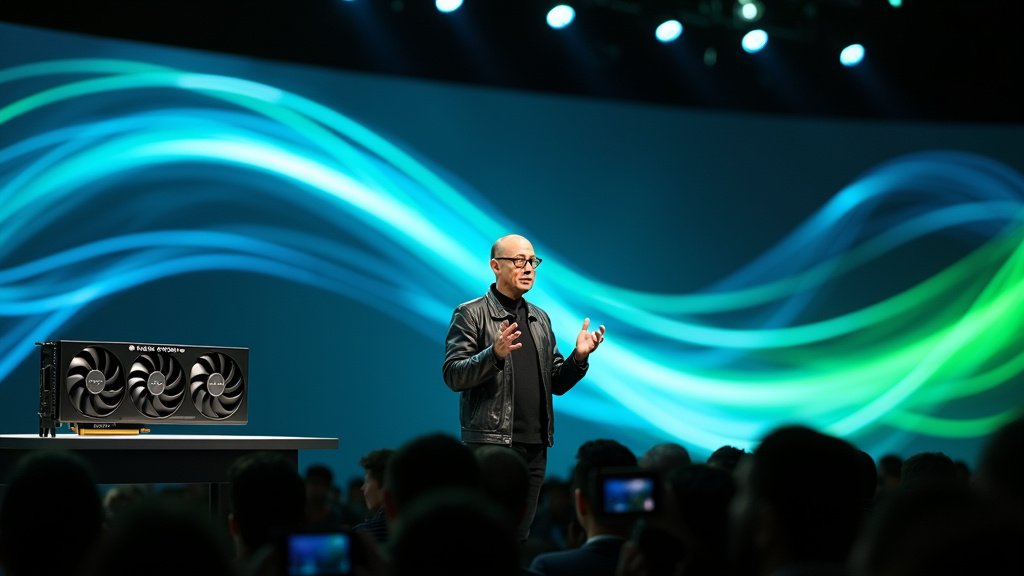Nvidia CEO Jensen Huang, speaking at the China International Supply Chain Expo in Beijing, praised China’s open-source artificial intelligence as a “catalyst for global progress” and a force “revolutionising” supply chains. Huang’s remarks, delivered at an event attended by an estimated 650 companies from 60 countries, underscored the importance of China’s AI advancements and their impact on global industries. His company, which recently reached a $4 trillion market value, is also developing a new chip, the RTX Pro GPU, specifically designed for Chinese clients and compliant with U.S. export restrictions.
China’s Pioneering Role in AI
Huang highlighted China’s pioneering role in the field, pointing to its influence on technological developments worldwide. He specifically mentioned Chinese AI startup DeepSeek, stating it is “giving every country and industry a chance to join the AI revolution.” This emphasis on open-source AI and its democratizing potential reflects a broader trend toward collaborative innovation within the global tech community. Huang’s comments suggest a belief in the transformative power of AI across multiple sectors.
New Chip Development and Export Strategy
The development of the RTX Pro GPU for the Chinese market demonstrates Nvidia’s strategy to navigate U.S. export controls while maintaining a significant presence in China. The U.S. government has assured Nvidia that licenses will be granted for this new chip, which is designed to comply with existing regulations. Additionally, the company has filed applications to sell the Nvidia H20 GPU again. This signifies Nvidia’s commitment to the Chinese market and its adaptability in the face of changing geopolitical dynamics. The RTX Pro GPU is designed to meet the specific needs of Chinese clients while adhering to the restrictions.
AI’s Transformative Impact Across Industries
During his speech, Huang elaborated on the broad impact of AI across numerous industries. He noted its significant role in scientific research, healthcare, energy, transportation, and logistics. This broad application underscores the pervasive nature of AI’s influence and its potential to reshape various aspects of the global economy and society. The capacity for AI to transform industries from healthcare to transportation highlights its importance for both the short and long term.
Market Reactions
The announcement of Nvidia’s developments in China had a positive impact on financial markets. Following the news, tech firm stocks experienced a surge, with the Nasdaq Composite index reaching a record high. Stocks in Hong Kong also rallied, reflecting investor confidence in Nvidia and the broader AI sector. These market reactions underscore the importance of Nvidia’s strategic moves in China and the impact of its technological advancements on global financial markets.
Context from Beijing
Al Jazeera’s Katrina Yu reported from Beijing, stating that Huang says he’s now free to sell to the Chinese market due to trade negotiations. This signifies a pivotal moment for Nvidia’s operations in China, demonstrating the evolving trade relations between the U.S. and China. This also allows Nvidia to play a key role in the ongoing development of China’s AI landscape, and to provide its products and services to Chinese companies and entities. The strategic focus on China’s AI sector indicates Nvidia’s vision for long-term growth.
Implications for Global Supply Chains
Huang’s description of China’s AI advancements as a catalyst for “revolutionising” supply chains highlights the potential for these technologies to reshape global trade. As AI-driven solutions become more integrated into various aspects of supply chain management, including logistics, manufacturing, and distribution, there will be a rise in efficiency and innovation. This evolution could redefine the landscape of international commerce. The company’s dedication to the Chinese market reveals its wider strategy, especially in the context of supply chains. Overall, the event demonstrates the current state of global AI and its trajectory.





